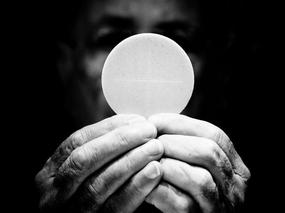
We believe Jesus Christ is present in the Holy Eucharist, not only in a symbolic manner, but fully present, body, blood, soul, and divinity. We understand his words “this is my body” to be taken literally, and for 2000 years we’ve exercised the utmost reverence for the Eucharistic host. This doctrine is hard to accept and has divided Christians since Jesus first declared it. In today’s Gospel, he says that the bread he will give is his flesh. A little farther in this Gospel, which will be read at Mass in two Sundays, we hear that “as a result of this teaching, many of Jesus’ disciples left him.” The 12 remaining Apostles were confused, and Jesus lays further stress on them by saying “will you also leave me?” Peter simply says “Lord, to whom else shall we go? You have the words of everlasting life.” Peter doesn’t understand very much of what Christ is saying, but he accepts it because he accepts Him.
Friendship
And isn’t that how friendships work? We trust people, not contracts. We understand people more for who they are, our whole experience of them, than for what they say or write. How many times have we said “Oh Josh, you don’t really mean that! I know you better than that”—meaning, I must be misunderstanding something you are saying because I know you don’t mean what I’m hearing. That’s the limitation of texting or emails, for example: it cannot convey the full range of human relationship—body language, past experiences, unspoken meanings—that is so crucial to human communication.
The Sacred Host
So God communicates himself in a total way, not just in a doctrine. The Eucharist is the Word made flesh, not just a doctrine but a Person, who is all love. “the bread that I will give is my flesh, for the life of the world,” Jesus says. I give you not a piece of me—a piece of my mind—but my whole self. You must “eat” me—take me completely into yourself, as I take you completely into myself. That is what “holy communion” means. In the Old Testament reading, Elijah was running for his life from the government (King Ahab) and eventually collapsed in the desert about 80 miles south of Jerusalem. “Take my life,” he says to God. “I cannot go on.” And he lies down to sleep. An angel awakens him: “Get up and eat,” and he finds a hearth cake and a jug of water on the rock beside him. From that food, which was the love of God, he found the strength to go on to his destiny, to ascend the holy mountain of God and gain the strength to carry out His will.
Soul Food
We need to eat physical food or our bodies atrophy. We need to eat intellectual food or our minds become stupid. And we need to eat spiritual food, or our spirits become coarse and hardened. Permit me to recommend four daily practices that have nourished the best people throughout the ages, from St. Augustine to St. Francis to Mother Teresa:
1) Prayer: every day, enter into a conversation with God, which means essentially listening to him in silence. Ten minutes, perhaps with the Scriptures, of keeping still.
2) Reading: practice the discipline of reading the Word of God, and not only the Bible, but also works of spirituality, such as lives of the saints or writings of the saints, even for only ten minutes a day.
3) The Eucharist: receive the Holy Eucharist every day if possible, and if not, make a spiritual communion, an act of desire for the Eucharistic Christ.
4) Our Blessed Mother: no one should go a day without greeting his mother, and telling her how much he loves her. Jesus gave us his mother from the Cross, and we should be careful not to neglect this gift.
So we feed our souls, and so we prepare for heaven.


 RSS Feed
RSS Feed